Evaluierung von Subventionsprogrammen
Diese Forschungsgruppe untersucht die Effekte von Produktions- und Wissensnetzwerken auf die Produktivität von Unternehmen und Regionen. Darüber hinaus werden Wirkungen staatlicher Förderprogramme für Forschung und Entwicklung sowie regionalpolitischer Programme auf die Leistungsfähigkeit von Unternehmen und Regionen evaluiert.
Zentrum für evidenzbasierte Politikberatung (IWH-CEP)
Forschungscluster
Wirtschaftliche Dynamik und StabilitätIhr Kontakt

Mitglied - Abteilung Präsidialbereich
PROJEKTE
09.2019 ‐ 09.2022
Etablierung einer evidenzbasierten Evaluationskultur für industriepolitische Fördermaßnahmen in Deutschland (EVA-KULT)
Europäischer Fonds für regionale Entwicklung (EFRE)
Das Vorhaben dient dem Ausbau des Zentrums für evidenzbasierte Politikberatung am Leibniz-Institut für Wirtschaftsforschung Halle (IWH-CEP).
01.2018 ‐ 12.2020
Vernetzt wachsen - Innovatives Sachsen-Anhalt durch digitale Geschäftsmodelle (Kompetenzzentrum 4.0)
Bundesministerium für Wirtschaft und Energie (BMWi)
01.2017 ‐ 12.2018
Politische Partizipation in Ostdeutschland
Bundesministerium für Wirtschaft und Energie (BMWi)
12.2015 ‐ 11.2018
Sozioökonomische Effekte der Erforschung innovativer Ansätze für die POC-Diagnostik
Bundesministerium für Bildung und Forschung (BMBF)
Teilvorhaben im Verbundprojekt “POC-Sensorplattform für chronisch-entzündliche Atemwegserkrankungen (EXASENS)”. Neun Leibniz-Institute arbeiten gemeinsam im Pilotprojekt EXASENS an der Erforschung einer Point-of-Care-Technologie zur Vorhersage und Diagnose von chronisch-entzündlichen Atemwegserkrankungen. Der Verbund wird vom Bundesministerium für Bildung und Forschung (BMBF) mit 6,25 Millionen Euro gefördert und liefert einen Beitrag zum Ausbau und zur Stärkung des Themenfeldes Gesundheitstechnologien.
Vgl. Pressemitteilung des Leibniz-Institut für Photonische Technologien (IPHT), Jena.
02.2017 ‐ 02.2018
Bedeutung außeruniversitärer Forschungseinrichtungen für die Entwicklung von Betrieben und Regionen
Bundesministerium für Bildung und Forschung (BMBF)
01.2015 ‐ 12.2016
Evaluierung der GRW-Förderung in Sachsen-Anhalt
Investitionsbank Sachsen-Anhalt
Referierte Publikationen
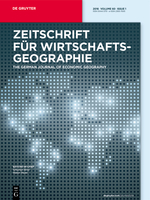
Die Treiber der räumlichen Emergenz und Konzentration der Photovoltaik-Industrie in Deutschland
in: Zeitschrift für Wirtschaftsgeographie, Nr. 3, 2015
Abstract
The drivers of the spatial emergence and clustering of the photovoltaic industry in Germany. Following the relatedness literature, we explore to what extent related industries influenced the regional emergence of the photovoltaic (PV) industry. In addition, we shed light on factors explaining selective processes of clustering. We particularly argue that generic resources and resources of related activities have been crucial for the regional concentration in early phases of the industry life cycle. With increasing maturity, industry-specific resources became more important. Based on a unique dataset containing population dynamics of the German PV industry, the hypotheses are tested empirically. Our results partially confirm the assumed beneficial effects of related industries for the emergence of the PV industry. Moreover, we observe changes in the relative importance of factors supporting regional concentration, with industry-specific resources becoming dominant as the industry matures.
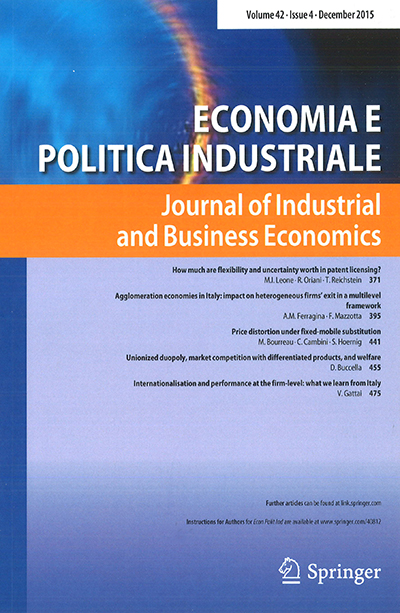
Determinants of Knowledge Exchange Between Foreign and Domestic Enterprises in European Post-transition Economies
in: Journal Economia e Politica Industriale (Journal of Industrial and Business Economics), Nr. 4, 2014
Abstract
The aim of this paper is to contribute to the literature on internationalised research and development by investigating determinants of knowledge and technology transfer between foreign subsidiaries and the local economy in European post-transition economies. This inquiry leads to a better understanding of determinants that influence this knowledge and technology exchange. Applying a logit model, we find that, in particular, the foreign subsidiary’s corporate governance structure, its embeddedness in the multinational enterprise’s internal knowledge base, its own technological capacity, the growth of the regional knowledge stock and the regional sectoral diversification are all positively associated with the transfer of knowledge. Subsidiaries’ investment motives and the relative weight of the sector of investment in the region’s economy appear to be of less importance. The analysis focuses on European post-transition economies, using the example of five selected Central Eastern European countries and East Germany. We exploit a unique dataset, the IWH FDI Micro database, which contains information on one thousand two hundred forty-five foreign subsidiaries in this region.
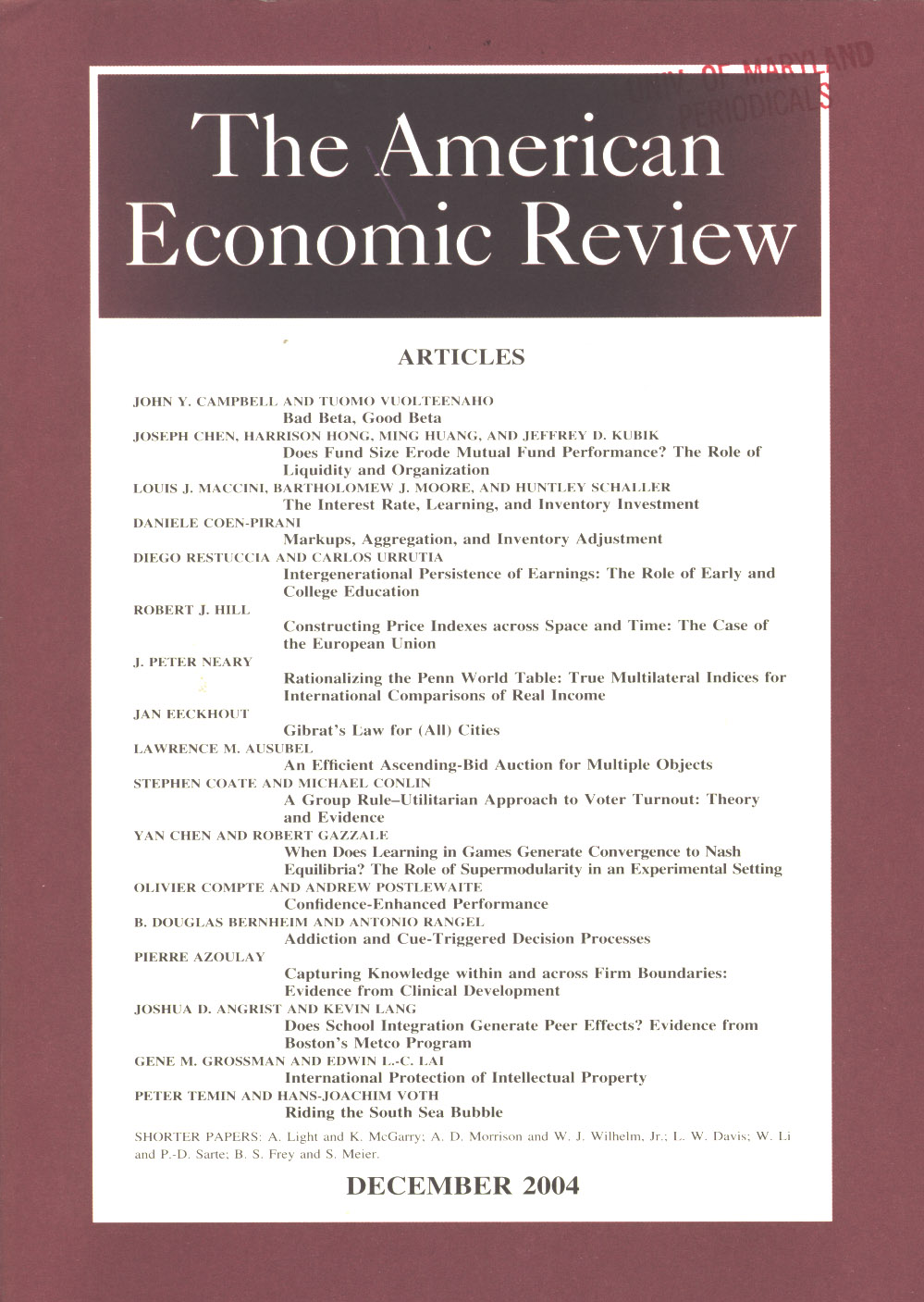
A Community College Instructor Like Me: Race and Ethnicity Interactions in the Classroom
in: American Economic Review, Nr. 8, 2014
Abstract
Administrative data from a large and diverse community college are used to examine if underrepresented minority students benefit from taking courses with underrepresented minority instructors. To identify racial interactions we estimate models that include both student and classroom fixed effects and focus on students with limited choice in courses. We find that the performance gap in terms of class dropout rates and grade performance between white and underrepresented minority students falls by 20 to 50 percent when taught by an underrepresented minority instructor. We also find these interactions affect longer term outcomes such as subsequent course selection, retention, and degree completion.
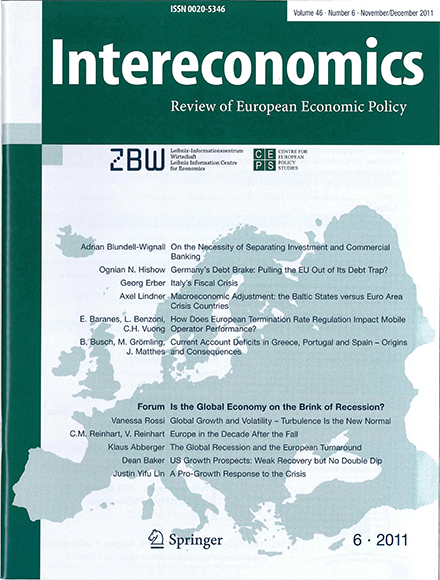
The Skills Balance in Germany’s Import Intensity of Exports: An Input-Output Analysis
in: Intereconomics, Nr. 2, 2014
Abstract
In the decade prior to the economic and financial crisis, Germany’s net exports increased in absolute terms as well as relative to the growing level of import intensity of domestically produced export goods and services. This article analyses the direct and indirect employment effects induced both by exports as well as by of the import intensity of the production process of export goods and services on the skills used. It shows that Germany’s export surpluses led to positive net employment effects. Although the volume of imports of intermediate goods increased and was augmented by the rise in exports, it could not undermine the overall positive employment effect.
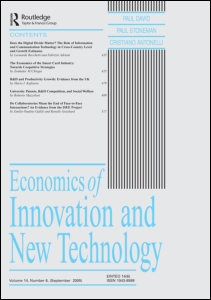
R&D Cooperation for Non-technological Innovations
in: Economics of Innovation and New Technology, Nr. 7, 2014
Abstract
Past research on the impact of R&D cooperation on firm innovation performance has almost solely focused on technological innovations. This paper investigates the impact of R&D cooperation on non-technological innovation performance of firms. In doing so, seven different cooperation partner types are distinguished. Survey data from German firms are used for the econometric analysis. It is shown that R&D cooperation increases the probability of a firm to introduce non-technological innovations. R&D cooperation with suppliers, consultants, other firms within the same firm group and universities has a significant positive impact on organizational and marketing innovation performance. Cooperation with governmental research institutes and competitors has no significant effect. R&D cooperation with customers has a significant impact on a firm's organizational innovation performance, but not on marketing innovation performance.














